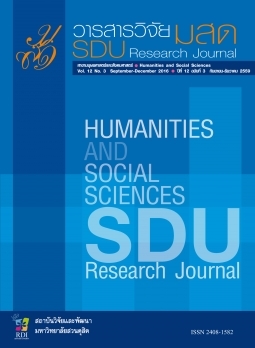การพัฒนาทักษะทางภาษาของเด็กปฐมวัยด้วยกิจกรรมการเรียนรู้แบบร่วมมือ ของผู้ปกครอง โรงเรียนตำรวจตระเวนชายแดน เขตจังหวัดเลย
Keywords:
Language Skills, Cooperative Learning between Parents and Early Childhood ChildrenAbstract
The research aimed to compare the language skills of early childhood children
before and after the collaborative activities with the involvement of parents and to study
the perception of parents in learning support of early childhood children. The sample was
early childhood children and parents associated with the Police Patrol School in Loei,
obtained by purposive sampling. The instruments used in this research were
the experimental instrument, cooperative learning, and the instruments for collecting data
were the test of language skills of early childhood children and the questionnaire to
evaluate the perception of parents regarding the learning support of early childhood
children. The data were analyzed by descriptive statistics using mean and percentage.
The results showed that the overall averages of language skills of early childhood children
post intervention were higher than pre-experiment. This showed that the activities that
promoted the learning language skills for children with the involvement of parents
in doing activities stimulated learning by interacting with the instruction media
and individuals. The change of average can be classified as follows: listening part was
changed mostly for the schools A and B (D
= 3.14, 22.90 percent) The tollowed by school
C (D
= 2.45, 20.43 percent), school E (D
= 2.42, 20.25 percent), and school D and school
E (D
= 2.00, 17.86 percent) respectively. Speaking part was changed mostly for school
C (D
= 5.27, 43.96 percent), tollowed by was school A and B (D
= 3.64, 26.55 percent),
school E (D
= 3.41, 28.54 percent) and school D (D
= 3.40, 30.36 percent), respectively.
Next, the reading part was changed mostly for school A and B (D
= 3.29, 24.00 percent)
followed by school E (D
= 2.50, 20.92 percent), school D (D
= 2.40, 21.42 percent), and
school C (D
= 0.86, 7.17 percent), respectively. The writing part was changed mostly for
school A and B (D
= 3.64, 26.55 percent), followed by school E (D
= 3.62, 30.29 percent),
school C (D
= 3.41, 28.44 percent), and school D (D
= 3.40, 30.36 percent), respectively.
Overall, the results showed that most parents could understand the learning support for
early childhood children at the high level (μ = 0.95, σ = 9.36). This Suggests that
cooperative learning with parents’ participation could lead to the understanding of the
parents toward the learning encouragement of early childhood children.
References
ชุมนุมสหกรณ์การเกษตรแห่งประเทศไทย จำกัด.
กุลยา ตันติผลาชีวะ. (2552). การศึกษาสำหรับผู้ปกครองเด็กปฐมวัย. กรุงเทพฯ: เบรน-เบส บุคส์.
จีระพันธุ์ พูลพัฒน์. (2558). การเป็นผู้นำทางการศึกษาปฐมวัย. วารสารวิจัย มสด สาขามนุษยศาสตร์และ
สังคมศาสตร์, 11(1), 1-16.
จีระพันธ์ พูลพัฒน์ และคณะ. (2553). ปฐมวัย: ครูยุคใหม่ไทยเข้มแข็ง. กรุงเทพฯ: โรงพิมพ์แห่งจุฬาลงกรณ์
มหาวิทยาลัย.
เต็มสิริ เนาวรังสี และคณะ. (2558). การสร้างความสัมพันธ์ระหว่างสถานศึกษา บ้านและชุมชน. กรุงเทพฯ:
มหาวิทยาลัยสวนดุสิต.
นิชรา เรืองดารกานนท์. (2554). ปัจจัยที่กระทบต่อพัฒนาการของเด็ก. กรุงเทพฯ: บริษัท บียอนด์
เอ็นเทอร์ไพรซ์ จำกัด.
ปทัตตา ภริตาธรรม. (2556). ครอบครัวพื้นฐานความเป็นอัจฉริยะ หมายเลข 1. กรุงเทพฯ: แพรธรรม.
ปนรรฐพร คำหาญสุนทร และวิภารัตน์ แสงจันทร์. (2559). การพัฒนาเว็บไซต์ฐานความรู้ด้านการศึกษา
ปฐมวัย. วารสารวิจัย มสด สาขามนุษยศาสตร์และสังคมศาสตร์, 12(1), 27-40.
ประวิชญา แข่งขัน และคณะ. (2557). การมีส่วนร่วมของผู้ปกครองในการจัดกิจกรรมส่งเสริมพัฒนาการ
กล้ามเนื้อมัดเล็กของเด็กปฐมวัย (รายงานผลการวิจัย). กรุงเทพฯ: มหาวิทยาลัยราชภัฏสวนดุสิต.
เมธาวี อุดมธรรมมานุภาพ และภริมา วินิธาสถิต. (2556). จิตวิทยาพัฒนาการและจิตวิทยาการศึกษา.
กรุงเทพฯ: มหาวิทยาลัยสวนดุสิต.
วิจารณ์ พานิช. (2555). วิถีสร้างการเรียนรู้เพื่อศิษย์ ในศตวรรษที่ 21. กรุงเทพฯ: มูลนิธิสดศรี - สฤษวงศ์.
สิริมา ภิญโญอนันตพงษ์. (2553). การวัดและการประเมินผลแนวใหม่เด็กปฐมวัย (ปรับปรุงแก้ไข).
กรุงเทพฯ: ดอกหญ้าวิชาการ.
สุรางค์ โค้วตระกูล. (2556). จิตวิทยาการศึกษา. กรุงเทพฯ: โรงพิมพ์แห่งจุฬาลงกรณ์มหาวิทยาลัย.
เอกอนงค์ ศรีสำอางค์. (2558). รูปแบบการมีส่วนร่วมของผู้ปกครองในการพัฒนาการเรียนการสอนสำหรับ
นักเรียนประถมศึกษาโรงเรียนสาธิตลอออุทิศ มหาวิทยาลัยสวนดุสิต. วารสารวิจัย มสด สาขา
มนุษยศาสตร์และสังคมศาสตร์, 11(2), 163-178.
Translated Thai References
Audumtummanupad, M. & Vinitasatid, P. (2013). Developmental and Educational
Psychology. Bangkok: Dusit Rajabhat University. (in Thai)
Bhulpat, J. (2015). Leader Early Childhood Education. SDU research Journal Humanities
and Social Sciences, 11(1), 1-16. (in Thai)
Bhulpat, J. et al. (2010). Childhood: New Teachers Strong Thailand. Chulalongkorn
University. Bangkok: Printing Chulalongkorn. (in Thai)
Cotakun, S (2013) Educational Psychology. Faculty of Education Chulalongkorn University.
Bangkok: Printing Chulalongkorn. (in Thai)
Kamharnsoontorn, P. & Sangchan, W. (2016). Development of a Knowledgebase Website in
Early Childhood Education. SDU Research Journal Humanities and Social
Sciences, 12(1), 27-40. (in Thai)
Khaengkhan, P. et al. (2015). Parental Participation in Holding Activities Promoting Early
Childhood’s Psychomotor Development (Research Report). Bangkok: SuanDusit
University. (in Thai)
Ministry of Education. (2009). The Potential of Language and Learning for Kids. Bangkok :
Printing Community Cooperative of Thailand. (in Thai)
Nouwalungsri, T. et al. (2015). Strategic Way to Provide Education for Parents, Learning
Document in Creating inextricably between School Home and Community.
Bangkok: SuanDusit University, (in Thai)
Panid, W. (2012). Learning Pathways for Students in Century 21. Bangkok: Sodsri-Salidwong
Foundation. (in Thai)
Paritatum, P. (2013). The Family is the Basic Intelligent Number One. Bangkok: Partum.
(in Thai)
Pinyoanuntapong, S. (2010). Measurement and Evaluations of New Early Childhood
Children (improve). Bangkok: Dokya academic. (in Thai)
Ruedakanun, N. (2011). Factors that Affect Child Development. Bangkok: ByonNterprit
Company. (in Thai)
Srisumaung, E. (2015). Teaching Processes of Students for Pratom La-or Utit Demonstration
School Suan Dusit Rajabhat University. SDU research Journal Humanities and
Social Sciences, 12(1), 163-178. (in Thai)
Tantiphlachiva, K. (2009). Education for Parents. Bangkok: Brent-Best Book. (in Thai)








